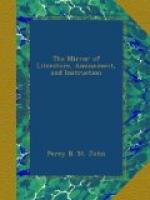The Amphisbaena, from its faculty of moving backwards or forwards at pleasure, has been thought to have a head at either extremity of its reptile body, but close inspection proves this opinion false. The fascinating power of the Rattlesnake, of which so many stories have in times past been related, and which was asserted to exist in its glittering eyes, has been of late years resolved into that extreme nervous terror of its victim (at sight of so certain a foe) which deprives it of the power of motion, and causes it to fall, an unresisting prey, into the reptile’s jaws. We may here pause to observe, en passant, that the antipathy which people of all ages and nations have felt against every reptile of the serpent tribe, from the harmless worm to the hosts of deadly “dragons” which infest the torrid zone, and the popular opinion that all are venomous, often in spite of experience, seems to be not so much superstition, as a terror of the species, implanted, since the fall, in our bosoms, by the same Divine Being who at that period pronounced the serpent to be the most accursed beast of the field.
(To be continued.)
* * * * *
SPIRIT OF THE PUBLIC JOURNALS.
TAIT’S EDINBURGH MAGAZINE.
Nothing if not political appears to be the order of the new magazine and other literary enterprises of the present day. Is this good policy in itself? it may be so from the vivifying aid it lends to the springs of imaginative writing. We have therefore no right to complain of the leaven of Mr. Tait’s Magazine: it is anything but dull: e.g. the life and jauntiness of the following paper is very pleasant, shrewd, and clever:
The Martinet.
The “Martinet” is the name of a genus, not of a species; the title of a race variously feathered, but having specific qualities in common. There is your military martinet, your clerical martinet, your legal martinet, and the martinet of common life, ("Gallicrista fastidiosa communis,” Linnaeus would class him,) who is to the others what the house-sparrow is to the rest of his tribe. It is with him alone we have to do. The “martinet” is a person who is all his life violently busied in endeavouring to be a perfect gentleman, and who almost succeeds. He misses the point by over-stepping it. He is like one of those greyhounds which outrun the hare fleetly enough, but cannot “take” her when they have done so. They have a little too much speed, and a little too little tact. The martinet is always bent upon thinking, saying, doing, and having, every thing after a nicer fashion than other people, until his nicety runs into downright mannerism; all his ideas become “clipped taffeta,” and all his eggs are known to have “two yolks.” He rarely comes of age or is thoroughly ripe till near forty, before which he may be a little of the




